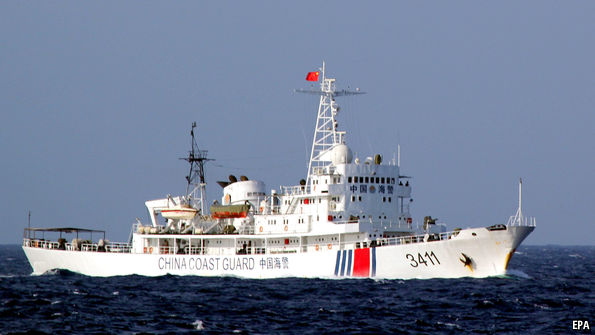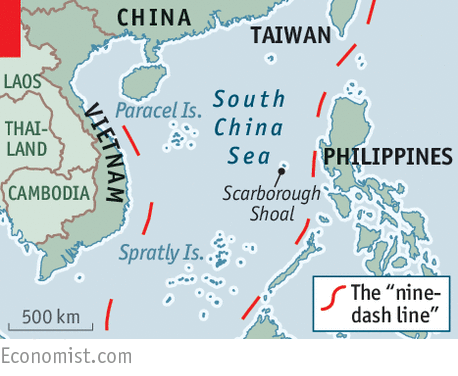

THE aggression that China has shown in the past few years in its vast territorial grab in the South China Sea has terrified its neighbours and set it on a collision course with America, long the guarantor of peace in East Asia. This week an international tribunal thoroughly demolished China’s vaguely defined claims to most of the South China Sea. How Beijing reacts to this verdict is of the utmost geopolitical importance. If, in its fury, China flouts the ruling and continues its creeping annexation, it will be elevating brute force over international law as the arbiter of disputes among states. China’s bullying of its neighbours greatly raises the risks of a local clash escalating into war between the century’s rising superpower and America, the current one. The stakes could hardly be higher.
Blown out of the water
The ruling by the Permanent Court of Arbitration in The Hague, in response to a case brought by the Philippines, is firm, clear and everything China did not want it to be (see article). The judges said that the UN Convention on the Law of the Sea (UNCLOS) should determine how the waters of the South China Sea are divided among countries, not China’s ill-explained “nine-dash line” which implies the sea is Chinese. None of the Spratly Islands in the south of the sea, claimed (and occupied) by several countries including China, can be defined as islands that can sustain human life, they ruled. This means no country can assert an Exclusive Economic Zone (EEZ) extending up to 200 nautical miles around them.
The court had no power to decide who owns which bits of land in the South China Sea. But the judges said that by building on rocks visible only at low tide, and thus not entitled under UNCLOS to any sovereign waters, China had encroached illegally into the Philippines’ EEZ. The court also said China had violated UNCLOS by blocking Philippine fishing boats and oil-exploration vessels and that Chinese ships had acted dangerously and unlawfully in doing so. Moreover, China’s island-building had caused “severe harm” to the habitats of endangered species, and Chinese officials had turned a blind eye to Chinese poaching of them.
For China, this is a humiliation. Its leaders have called the proceedings illegal. Its huge recent live-fire exercises in the South China Sea imply that it may be planning a tough response. This could involve imposing an “Air Defence Identification Zone” of the kind it has already declared over the East China Sea. Or China might start building on the Scarborough Shoal, which it wrested from the Philippines in 2012 after a stand-off between the two countries’ patrol boats.
That would be hugely provocative. Although America is deeply reluctant to risk a conflict, President Barack Obama is thought in March to have warned his Chinese counterpart, Xi Jinping, that any move on Scarborough Shoal would be seen as threatening American interests (the Philippines is a treaty ally). For China to call its bluff in a sea that carries $5.3 trillion in annual trade would be reckless and irresponsible.
There is a better way. China could climb down and, in effect, quietly recognise the court’s ruling. That would mean ceasing its island-building, letting other countries fish where UNCLOS allows and putting a stop to poaching by its own fishermen. It would have good reason: its prestige and prosperity depend on a rules-based order. It would be in China’s interests to secure peace in its region by sitting down with the Philippines, Vietnam and other South-East Asian neighbours and trying to resolve differences. Right now those countries, and America, should avoid action that will needlessly enrage China, and instead give it a chance to walk back from the edge.
